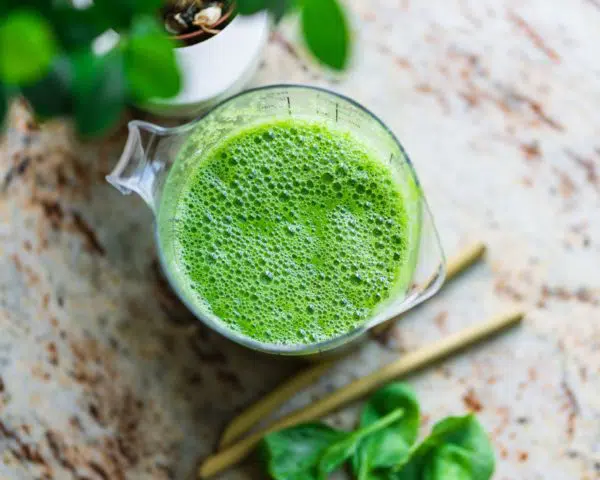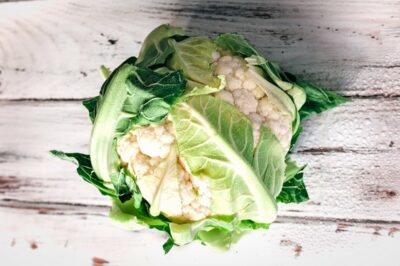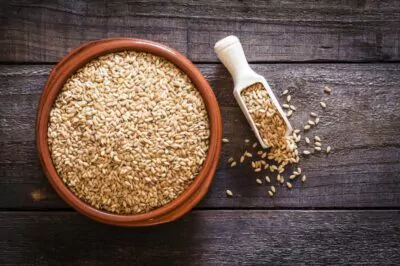Table of Contents[Hide][Show]
Smoothies: our favorite way to pack our diets full of veggies while tasting nothing but sweet berry goodness. Maybe you’ve tried adding carrot juice or beets to your smoothies, but there’s a new trend hitting your corner smoothing shops—throwing cauliflower, zucchini, and other unusual veggies into the mix.
Not only are these veggies full of good-for-you nutrients, they also give your smoothies a rich and creamy texture without adding diary. Here’s what you get when you add cauliflower to your smoothies.
benefits of Cauliflower smoothies
Cauliflower is a new crowd favorite for many reasons. According to health professionals it is one of the most nutritious vegetables, loaded with vitamins and minerals, many of which people don’t get enough of.
The nutrient profile of raw cauliflower contains a large variety of the nutrients the USDA recommends we incorporate into our daily diets.
Melissa Welch, R.D. breaks down the health benefits of eating 1 cup of raw cauliflower:
Vitamin C
77% of the recommended daily intake (RDI)
Vitamin C is your best friend in avoiding a cold this winter. It’s your body’s biggest aid in immune function, as well as having antioxidant properties that reduce inflammation.
Vitamin K
20% of the RDI
Vitamin K is an essential component in blood clotting. If your rough and tough make sure your getting enough vitamin K so your scrapes and scratches heal quickly.
Vitamin B6
11% of the RDI
Vitamin B6 is a key element in glucose metabolism, helping your body properly convert your sugar into energy and keeping you slim.
Folate
14% of the RDI
Folate also plays a role in your body’s metabolic process, as it is critical for metabolizing nucleic acid precursors.
Pantothenic acid
7% of the RDI
Pantothenic acid is the main element in energy metabolism. All of these energy metabolizing vitamins may seem like overkill, but hey, we’re turning food into power here.
Potassium
9% of the RDI
Cauliflower is a good alternative to bananas. It provides the potassium needed to prevent muscle contractions, or cramping, and is a great source of electrolytes.
Manganese
8% of the RDI
Manganese helps keep your brain and nerve function in tip-top shape.
Magnesium
4% of the RDI
Magnesium also helps with cramping and is thought to be a natural sleep aid.
Phosphorus
4% of the RDI
Phosphorus is essential in bone health.
Choline
11% of the adequate intake for women and 8% for men
Choline plays a huge role in maintaining cell membranes and supporting metabolism. It also helps with brain and nerve function and prevents cholesterol from accumulating on the liver. Choline isn’t found in many foods, so getting plenty of cauliflower into your diet is a great way to ensure choline finds its way into your system.

benefits of getting enough Fiber
On top of all of that healthy goodness, cauliflower is also a great source of fiber. In 1 cup of raw cauliflower you get 3 grams of fiber which is 10% of your recommended daily intake.
Our body’s need this fiber for healthy digestion, reducing constipation, and feeding the healthy bacteria in our gut that reduce inflammation.
fiber and your diet
Another benefit of cauliflower is possible weight loss. Even though it’s jam-packed with nutrients it’s very low in calories and high in fiber. Fiber gives you a feeling of fullness, so you can eat less and still feel satiated. Maintaining a diet with a lower caloric intake may lessen your chance of heart disease, while also keeping you lean.
the importance of Antioxidants
Within the past decade, research is showing more and more that antioxidants are linked to cancer prevention. Cauliflower is a great source of glucosinolates and isothiocyanates, antioxidants that have been shown to slow the growth of cancer cells.
Studies have shown they’re especially protective against lung, prostate, breast and colon cancer.
the science behind it
While these antioxidants slow cell growth, sulforaphane (also found in cauliflower) is an antioxidant that has been shown to suppress cancer by inhibiting enzymes that are a part of cancer cell and tumor growth. In animal and test-tube studies this antioxidant has destroyed damaged cells, showing potential to stop the spread of cancer.
Cauliflower also contains carotenoid and flavonoid antioxidants that have shown similar anti-cancer effects, as well as the potential to reduce the risk of heart disease.
But how do Cauliflower smoothies taste?
There’s no doubt that adding cauliflower to your smoothies is the healthy choice, but no one wants to ruin a smoothie, no matter how good it is for you. No worries! Cauliflower is the new favorite addition because it adds great texture while maintaining the originally intended flavor of the smoothie.
cooked or raw?
You receive the most health benefits from eating raw cauliflower as opposed to cooked, but whether or not you prefer fresh or freshly frozen is up to you. When you blend in fresh, raw cauliflower your smoothie will take on a creamier texture. If you choose frozen cauliflower you will get a little more of a slushy-like consistency. Both are delicious and I find myself opting for slushy in the summer and creamy in the winter.
an easy addition
Cauliflower has a fairly mild taste as it is, but I find that adding half a cup extra of whatever ingredient I’m focusing on will guarantee you forget all about the cauliflower. Next time you’re whipping up a strawberry banana smoothie add in a cup of cauliflower for an easy health boost.
Have you tried adding cauliflower to your smoothies? Share your experience or favorite recipes to the comments below!








Yes! I made cauliflower smoothies (and more!) on TV recently. Check it out: https://youtu.be/mXdNKgpXyWA